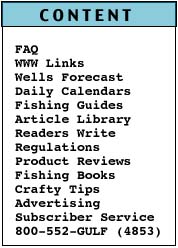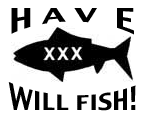
The Saltwater Magazine for Gulf Coast Fishing!
FISHING FORECASTS
| FISHING CALENDARS | ARTICLES | ADVERTISE
| SUBSCRIBE
Search Gulf Coast Fisherman's
Web Site
Past articles, specific
places or fish, etc.

MAYDAY!
How to Call for Help in a Life-Threatening Emergency
From the U.S. Coast Guard Office of Search and Rescue
![]()
| CURRENT
MOON lunar phases |
A lot of mishaps can occur out on the water, but thankfully most are more inconvenient and embarrassing than anything else. But when lives are on the line - your boat is on fire or sinking rapidly with people on board, for example, or someone is in imminent danger of dying without immediate medical assistance - you want every available resource dispatched to your position. A Mayday! call will bring that kind of help. Not only will the U.S. Coast Guard respond but the Coast Guard may notify state and local search and rescue units in your vicinity and ask them to respond as well. The Coast Guard will also transmit an Urgent Marine Information Broadcast over marine-band VHF-FM radio Channel 16, notifying all vessels in the area of your emergency. In many cases a nearby Good Samaritan will be first on the scene to render assistance.
Emergencies can go from bad to worse in seconds so try to get as much information across in as little time as possible._ International Maritime Organization protocols call for beginning the transmission with the word "Mayday" repeated three times, followed by the name and number of your vessel and its position. If you have a marine GPS, relate the latitudinal and longitudinal coordinates. If not, state your distance and magnetic or true bearing from the closest navigational landmark. If time allows, you can also relay your departure point, departure time and the speed at which you were traveling. All of these can help rescuers locate you. (See Sidebar for step-by-step instructions.)
A Mayday - the term is derived from the French venez m'aider, meaning "Come. Help me" - should be transmitted if possible via marine-band VHF-FM radio Channel 16 or 2182 kHz MF/SSB. |
Mayday!
Once you've made contact and given your information, Coast Guard Search and Rescue planners will keep you advised of their actions and give you an estimate of when rescue units will arrive on the scene. If you have a medical emergency, assign someone to monitor the radio from the time you make the call until the rescuers are on the scene. The Coast Guard will direct you to the nearest safe haven and advise you on what actions you should take in the interim.
The Rescue Coordination Center or local Coast Guard station may deploy a helicopter, rescue vessel or nearby commercial ship, depending on your location, local weather, availability of crew and equipment and nature of the emergency.
When the Coast Guard receives your Mayday, the Mission Coordinator will determine your degree of danger by considering several factors: the nature of your situation and the gear on board your vessel (first aid kit, food, water, life jackets.), the accuracy of your position, the tide, visibility, current and sea conditions, present and forecasted weather, special considerations (age/health of those on board, for example), whether you have reliable communications, the degree of fear in those on board, and the potential for the situation to deteriorate further.
If a helicopter is dispatched, be sure to secure all loose items on deck (helicopter rotor wash is very powerful and unsecured items may turn into flying projectiles.) Lower and secure any sails, remove any equipment that may snag the line attached to the rescue basket, and make sure everyone is wearing a life jacket. The helicopter is likely to approach your boat on the port stern quarter, because it gives the pilot optimal visibility from the cockpit. So unless instructed otherwise, set your course so that the wind is 45 degrees off your port bow. Remember, never shine a light or strobe directly toward the helicopter, and never fire flares in the vicinity of the helicopter. Wait for the rescuers to tell you what to do, and then do it. In any emergency situation, listening may be your most important skill.
Recently the Coast Guard began implementing a new command, control and communications system - Rescue 21 - which is now being installed in stages across the United States. It will vastly improve the Coast Guard's ability to save lives and property. (For more information see www.uscg.mil/Acquisition/rescue21/strategy.asp.) Harnessing global positioning and other advanced communications technology, this fully integrated system will cover coastlines, navigable rivers and waterways in the continental United States, Alaska, Hawaii, Guam and Puerto Rico, and help eliminate 88 known radio coverage gaps.
No new equipment is needed for you to benefit from Rescue 21, but you can help improve response time by upgrading to a Marine-Band VHF-FM radio equipped with digital selective calling (DSC). When properly registered with a Maritime Mobile Service Identity (MMSI) number and interfaced with GPS, the DSC radio signal transmits vital information - vessel name, position, owner/operator's name and the nature of the distress (if entered) - with one push of a button.
The U.S. Coast Guard is always ready to render aid to boaters facing extreme and imminent danger. Your best bet, however, is to reduce your risk of finding yourself in a dire situation in the first place. Keep your vessel's hull, motor and on-board equipment in top condition. At the start of the boating season, get a Vessel Safety Check, offered free by your local U.S. Coast Guard Auxiliary, United States Power Squadron® or state boating agency. Take a basic seamanship course and additional instruction as necessary to ensure that your boating skills match the requirements of your vessel. Finally, insist that everyone on board wear a life jacket at all times on the water. Life threatening emergencies can happen in a heartbeat. Having a life jacket on increases everyone's chances of survival.
* * * * *
How to Place a Mayday Call.
Two things to remember: (1) a Mayday call should be made only if there is extreme and imminent danger to life and/or property; for example, someone will die without immediate assistance or your boat is on fire or sinking rapidly with people on board, and (2) although Marine VHF-FM radio Channel 16 is the primary radio channel for calling in a Mayday, boaters facing extreme and imminent danger may use any frequency to alert other boaters or persons on shore of their situation.
Make Channel 16 your first option, however. The U.S. Coast Guard, Canadian Coast Guard, most coast stations, and all ships required to carry a marine radio maintain a listening watch on this channel. To make a voice distress call, follow these steps:
1. Make sure your radio is on.
2. Select Channel 16 for standard marine VHF (Channel 70 for DSC)
3. Press/Hold the transmit button.
4. Clearly say: "MAYDAY, MAYDAY, MAYDAY."
5. Then give:
o Vessel Name, Number and/or Description
o Position and/or Location
o Nature of Emergency
o Number of People on Board, their condition and whether they are wearing life jackets
6. Release transmit button
7. Wait for 10 seconds. If no response, say "MAYDAY, MAYDAY, MAYDAY" and repeat the steps as above. Be ready to follow instructions once the Coast Guard responds.
If your vessel is equipped with a Digital Selective Calling (DSC)-capable radio, and you have obtained and registered an MMSI number, and it is properly connected to a GPS receiver, you need only press the red DSC Emergency Call Button for 5 seconds to summon aid. Your vessel information and position will automatically be transmitted, including the nature of the distress (if entered), and a reply should be received almost immediately. Upon receipt of this acknowledgement, your radio should automatically shift to marine-band VHF-FM radio Channel 16 to continue voice communications with rescuers. If no reply is received, go ahead and switch your radio to Channel 16 and use the standard procedure above.
If you don't have a marine-band radio on board, you can also telephone to report maritime search and rescue emergencies. Keep the following numbers close at hand and be ready to provide the same information as above. Your information will be relayed to rescuers in your area.
For the Great Lakes, Gulf and East Coasts:
Atlantic Area Command Center
Tel:
757-398-6700
For the Hawaiian, Alaskan and Pacific Coasts:
Pacific Area Command Center
Tel: 510-437-3701
...and what to do if you hear one -
A Good Samaritan may be closest to the scene in a boating emergency so if you hear a Mayday and you are in the area, stand by to provide assistance.
Stay off the marine radio. The Coast Guard needs to be able to communicate with a vessel in distress as response teams gather, emergency procedures are initiated, search and rescue craft embark or helicopters take off. Also, if no one else is transmitting on that frequency, the Coast Guard can determine a vessel's position with a Radio Directional Finder and triangulation.
Copy any information you hear from the vessel in distress - name of the vessel, position, persons on board, etc. If you have DSC, shut the radio alarm off by pressing any button on your radio, then write down the Mobile Maritime Service Identifier number and position information showing on your radio display screen.
Wait 3-5 minutes for an authority to answer the call. If no one replies, then attempt to verbally relay the information to U.S. Coast Guard and standby. If you hear the Coast Guard call for a vessel in the area to assist or if you are in the area and the logical vessel to render aid, head for the vessel and, when there's a break in the transmissions, call the Coast Guard with your offer to provide assistance.
The U.S. Coast Guard is asking all boat owners and operators to help reduce fatalities, injuries, property damage, and associated healthcare costs related to recreational boating accidents by taking personal responsibility for their own safety and the safety of their passengers. Essential steps include: wearing a life jacket at all times and requiring passengers to do the same; never boating under the influence (BUI); successfully completing a boating safety course; and getting a Vessel Safety Check (VSC) annually from local U.S. Coast Guard Auxiliary, United States Power Squadrons®, or your state boating agency's Vessel Examiners. The U.S. Coast Guard reminds all boaters to "Boat Responsibly!" For more tips on boating safety, visit www.uscgboating.org.
PHOTO CAPTION:
In a serious emergency you want every available resource dispatched
to your position as quickly as possible. Here Petty Officer 3rd Class Michael
Gervis holds onto a nine-month-old infant as the Coast Guard rescues a family
of six off their sinking vessel, 13 miles east of Miami Beach, FL.
Home | Back


